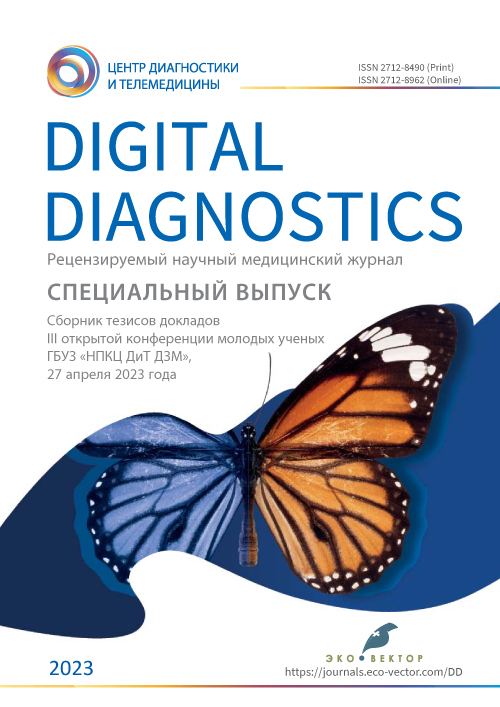Ethical issues associated with the use of virtual reality in medicine
- Авторлар: Grebnyakova D.A.1, Shilkina Y.I.1
-
Мекемелер:
- N.I. Pirogov Russian National Research Medical University
- Шығарылым: Том 4, № 1S (2023)
- Беттер: 33-34
- Бөлім: Conference proceedings
- ##submission.dateSubmitted##: 18.05.2023
- ##submission.dateAccepted##: 18.05.2023
- ##submission.datePublished##: 26.06.2023
- URL: https://jdigitaldiagnostics.com/DD/article/view/430336
- DOI: https://doi.org/10.17816/DD430336
- ID: 430336
Дәйексөз келтіру
Толық мәтін
Аннотация
Due to improvements in the medical techniques used, virtual reality technologies are increasingly used to treat various diseases. Simultaneously, various ethical issues emerged. Knowing exactly what problems the treating physician and the patient may be facing is important to increase the effectiveness of therapy. This will help minimize or at least prevent negative consequences. A qualitative secondary study was conducted on the ethical issues arising from the application of virtual reality technologies in treatment. Papers suitable for analysis were searched using the keywords “virtual reality”, “ethical issues”, and “medicine”. The works of the last 10 years were selected, most of the sources being at most 5 years old. After analyzing papers and studies which describe the experience of applying virtual reality technologies in medicine, the range of ethical problems that are currently relevant was determined most accurately. Firstly, the vulnerability of patients is evident, which arises from the realism of the avatars and the deep immersion in the virtual world. Without the physician’s supervision, the patient may experience a high degree of psychological pressure, which has a negative effect. Secondly, strong emotional involvement is possible, which may develop attachment to the artificial intelligence and cause derealization, depersonalization, and other mental disorders. Thirdly, active interaction with the virtual world may be accompanied by long-lasting effects, such as gaming disorder. Finally, patients may have difficulties in distinguishing between reality and simulation, which affects autonomous choice and compromises informed consent. Virtual reality technologies may potentially change the lives of trauma patients and improve their quality of life. However, these changes are accompanied by ethical issues that must be addressed with respect to the vulnerability and nature of trauma.
Негізгі сөздер
Толық мәтін
Due to improvements in the medical techniques used, virtual reality technologies are increasingly used to treat various diseases. Simultaneously, various ethical issues emerged. Knowing exactly what problems the treating physician and the patient may be facing is important to increase the effectiveness of therapy. This will help minimize or at least prevent negative consequences. A qualitative secondary study was conducted on the ethical issues arising from the application of virtual reality technologies in treatment. Papers suitable for analysis were searched using the keywords “virtual reality”, “ethical issues”, and “medicine”. The works of the last 10 years were selected, most of the sources being at most 5 years old. After analyzing papers and studies which describe the experience of applying virtual reality technologies in medicine, the range of ethical problems that are currently relevant was determined most accurately. Firstly, the vulnerability of patients is evident, which arises from the realism of the avatars and the deep immersion in the virtual world. Without the physician’s supervision, the patient may experience a high degree of psychological pressure, which has a negative effect. Secondly, strong emotional involvement is possible, which may develop attachment to the artificial intelligence and cause derealization, depersonalization, and other mental disorders. Thirdly, active interaction with the virtual world may be accompanied by long-lasting effects, such as gaming disorder. Finally, patients may have difficulties in distinguishing between reality and simulation, which affects autonomous choice and compromises informed consent. Virtual reality technologies may potentially change the lives of trauma patients and improve their quality of life. However, these changes are accompanied by ethical issues that must be addressed with respect to the vulnerability and nature of trauma.
Авторлар туралы
Darya Grebnyakova
N.I. Pirogov Russian National Research Medical University
Хат алмасуға жауапты Автор.
Email: grebnyakova@yandex.ru
ORCID iD: 0009-0003-6131-8127
Ресей, Moscow
Yaroslava Shilkina
N.I. Pirogov Russian National Research Medical University
Email: shilkina_yaroslava@mail.ru
ORCID iD: 0009-0005-7982-5527
Ресей, Moscow
Әдебиет тізімі
- Kellmeyer P. Neurophilosophical and Ethical Aspects of Virtual Reality Therapy in Neurology and Psychiatry. Camb Q Healthc Ethics. 2018;27(4):610–627. doi: 10.1017/S0963180118000129
- Parsons TD. Ethical Challenges of Using Virtual Environments in the Assessment and Treatment of Psychopathological Disorders. J Clin Med. 2021;10(3):378. doi: 10.3390/jcm10030378
- Luxton DD. Recommendations for the ethical use and design of artificial intelligent care providers. Artif Intell Med. 2014;62(1):1–10. doi: 10.1016/j.artmed.2014.06.004
- Kellmeyer P, Biller-Andorno N, Meynen G. Ethical tensions of virtual reality treatment in vulnerable patients. Nat Med. 2019;25(8):1185–1188. doi: 10.1038/s41591-019-0543-y
- Torda A. CLASSIE teaching — using virtual reality to incorporate medical ethics into clinical decision making. BMC Med Educ. 2020;20(1):326. doi: 10.1186/s12909-020-02217-y
- Madary M, Metzinger TK. Recommendations for Good Scientific Practice and the Consumers of VR-Technology. Frontiers in Robotics and AI. 2016;3 Suppl. 3:1–23.
- Iserson KV. Ethics of Virtual Reality in Medical Education and Licensure. Camb Q Healthc Ethics. 2018;27(2):326–332. doi: 10.1017/S0963180117000652
Қосымша файлдар










